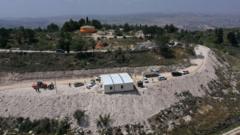Israeli ministers have confirmed that the newly sanctioned settlements will be legally recognized, despite widespread international condemnation.
Israel Moves to Expand Settlements in West Bank, Sparking Controversy

Israel Moves to Expand Settlements in West Bank, Sparking Controversy
In a significant decision, Israel has approved the establishment of 22 new Jewish settlements in the West Bank, marking its largest expansion of settlements in decades amidst escalating tensions.
Israeli officials have characterized the settlements as a safeguard against potential threats, while Palestinian authorities have condemned the move as an alarming escalation of the ongoing conflict, which they argue undermines the possibility of a future Palestinian state.
Israeli ministers have announced the approval of 22 new Jewish settlements in the occupied West Bank, marking the most substantial expansion of settlements seen in decades. The Defence Minister Israel Katz and Finance Minister Bezalel Smotrich highlighted that several of the new settlements will receive retrospective legality, transforming previously unauthorized outposts into legally recognized communities under Israeli law.
This development is expected to exacerbate already high tensions in the region, as settlements have been a longstanding point of contention in the Israeli-Palestinian conflict. While Israeli officials argue that the settlements are critical to preventing the establishment of a Palestinian state that they believe would threaten Israeli security, these claims have been met with fierce backlash from Palestinian leaders.
The Palestinian presidency denounced the plan, labeling it a "dangerous escalation" that undermines any hope for a peaceful resolution to the conflict. The Israeli anti-settlement group Peace Now issued a warning that the expansion of settlements would dramatically alter the landscape of the West Bank and further entrench the Israeli occupation.
Since taking control of the West Bank and East Jerusalem during the 1967 Middle East War, Israel has expanded its settlements, currently housing approximately 700,000 Jewish residents. The international community widely views these settlements as illegal, a point that remains adamantly disputed by Israeli officials. As this situation continues to develop, the implications for both Israeli and Palestinian futures remain precarious at best.
Israeli ministers have announced the approval of 22 new Jewish settlements in the occupied West Bank, marking the most substantial expansion of settlements seen in decades. The Defence Minister Israel Katz and Finance Minister Bezalel Smotrich highlighted that several of the new settlements will receive retrospective legality, transforming previously unauthorized outposts into legally recognized communities under Israeli law.
This development is expected to exacerbate already high tensions in the region, as settlements have been a longstanding point of contention in the Israeli-Palestinian conflict. While Israeli officials argue that the settlements are critical to preventing the establishment of a Palestinian state that they believe would threaten Israeli security, these claims have been met with fierce backlash from Palestinian leaders.
The Palestinian presidency denounced the plan, labeling it a "dangerous escalation" that undermines any hope for a peaceful resolution to the conflict. The Israeli anti-settlement group Peace Now issued a warning that the expansion of settlements would dramatically alter the landscape of the West Bank and further entrench the Israeli occupation.
Since taking control of the West Bank and East Jerusalem during the 1967 Middle East War, Israel has expanded its settlements, currently housing approximately 700,000 Jewish residents. The international community widely views these settlements as illegal, a point that remains adamantly disputed by Israeli officials. As this situation continues to develop, the implications for both Israeli and Palestinian futures remain precarious at best.




















